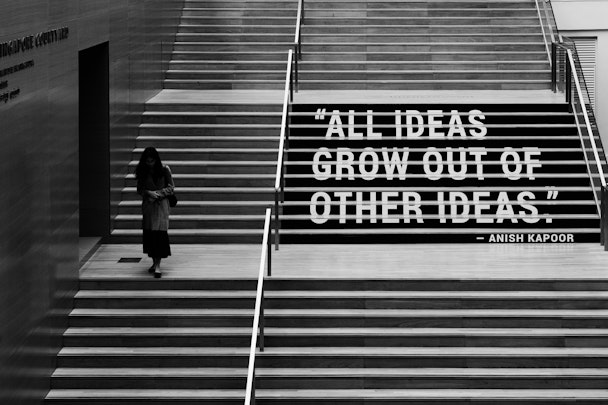The pitch process is broken. Brands should know the value of ideas
On the pitch process, Olivia Wiltshire of digital agency Builtvisible talks chemistry over concepts, and why marketers need to be a ‘force for good’.

With the average pitch costing more than £11k, agencies can’t afford to lose control of the pitch process / CJ Dayrit
With everyone navigating this macroeconomic omnishambles, it’s high time we look at the agency-brand pitching process and finally make some changes to level the playing field between the two sides.
A recent JFDI/Opinium survey found the average pitch cost agencies more than £11k and withdrawn budgets are responsible for 33% of lost pitches.
This all becomes even more complex and frustrating when pitching creative ideas due to the expectations of those ideas and the subjectivity of that audience. The same survey showed even if you win the pitch over half of the ideas included in the process are never even used.
It’s time for agencies to take control of the pitching process, demand more equilibrium from brands during the process, and put a stop to professional ghosting to forge better outcomes for all.
Advertisement
1. Choose chemistry, not concepts
While you need to spend money to make money, the challenges of resourcing new business opportunities remain ever-present for agencies. Responsibility sits on both sides here: brands need to run a smarter process and agencies need to be careful where they spend their precious time.
The search for the right agency has the same principles as dating; you're looking for a viable match.
Taking a leaf out of the dating process where you first rely on some key personal creds before setting up a tête-à-tête, why don’t we apply the same to pitching?
Let’s pivot the process to rely more heavily on agency creds, examples of previous work and pre-read materials, which later crescendos into a chemistry meeting or two to stress test the brand-agency dynamics and kick out the formal pitch altogether.
Advertisement
2. Don’t engage if you can’t back it up with budget
Ghosting, in dating, describes someone who suddenly and without explanation stops communicating. In business, this manifests with brands starting a tender process without being ready for it.
The resulting outcome is usually the brand unexpectedly pulls out or rejects a partnership for generic reasons, e.g., lack of budget or change in direction. Or worse, 40% of the time giving no reason at all.
In my opinion, I think the crux of the issue is those brands were not ready to kick off a tender process in the first place, and that, for example, the person who started the process hadn’t aligned with the ultimate decision-maker.
Suggested newsletters for you
I understand that budgets are sometimes unexpectedly pulled, and no doubt more so in the current climate, but to brands out there, please get your ducks in a row as best you can.
At the very least, be transparent with agencies that you will need their help to justify the budget to your boss. If you’re clear about your own internal challenges, agencies can respond to that as part of the process, ultimately helping you be your brand’s advocate. It’s a case of being transparent and communicating clearly from the off.
3. Brands should invest in ideas, too
Creative pitching brings additional challenges due to the fact creative ideas or concepts sit in a grey area of subjectivity. Anyone can have an opinion on an idea, but it’s harder to query an argument for better page speed, for example, due to its black-and-white nature.
Moreover, brands now expect oven-baked ideas ready to go at the point of pitch. I can understand why this is the expectation, as you want to see what the agency can do for your brand.
However, I heard Robert Bassett when he said, “when navigating a new client relationship, agencies should be wary of giving away their ideas for free”. Are brands using the pitch process to solicit free creative concepts from an agency?
To overcome this, creative pitching should become more of a two-way street. If fully fleshed-out ideas are the must-have, then agencies could explore asking brands for a financial commitment for that work either pre- or post-pitch. Alternatively, agencies could consider ‘IP-ing’ their ideas.
Better still, why not focus on that chemistry meeting to become more of an ideation workshop to exemplify better how brand and agency can work together in the future? Asking for a time commitment from the brand ensures they’re invested, too.
Let’s be a force for good
At the end of the day, everyone’s time is a precious commodity, but I think brands are unclear about what they are asking from agencies.
In the spirit of the pitch positive pledge, I think agencies need to band together and explore some of the alternative approaches I’ve mentioned, to ultimately level out the pitch process and achieve better outcomes for all involved.
Content by The Drum Network member:

Builtvisible
We connect a digital society.
Made possible through technology, made personal through data, made powerful through content. Bringing people, communities and...

